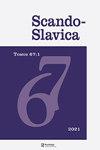When Modality and Tense Meet. The Future Marker budet ‘will’ in Impersonal Constructions with the Modal Adverb možno ‘be possible’
IF 0.2
0 HUMANITIES, MULTIDISCIPLINARY
引用次数: 0
Abstract
This paper examines Russian impersonal constructions with the modal word možno ‘can, be possible’ with and without the future copula budet ‘will be,’ i.e., možno + budet + inf and možno + inf. My c...当情态和时态相遇时。将来时标记在人称结构中用情态副词možno“be possible”表示“will”
本文研究了带有情态词možno“can, be possible”的俄语人称结构,有或没有未来连词budget“will be”,即možno + budget + inf和možno + inf。我的c…
本文章由计算机程序翻译,如有差异,请以英文原文为准。
求助全文
约1分钟内获得全文
求助全文

 求助内容:
求助内容: 应助结果提醒方式:
应助结果提醒方式:


